|
|
|
integrity of ancient information
Saturday, October 27 2001
Since Gretchen's brother Brian is a good son, he's decided to have a traditional Jewish wedding, complete with every archaic nuance. He's a medical doctor, and an intelligent, enlightened one at that. But cultural affinity is very important to the family, so things had to be done just so.
The wedding itself was to be held on Sunday, but there were so many rituals that needed to be performed that some had spilled over to today. This is why Gretchen had insisted I come a day in advance.
This morning, Gretchen and I dressed up in fancy clothes and rode with Brian and his soon-to-be-wife Jen to the synagogue, which Brian jokingly referred to as "the 'gogue." We stopped along the way at a drug store to pick up extremely medicinal-tasting generic cough drops.
What followed was a very traditional Conservative Jewish Shabbat service. Most of what was said was sung, and the majority was in ancient Hebrew. Interestingly, though Gretchen had most of the melodious songs memorized to the extent that she could sing along, she didn't really know what they were about. For her it was all raw, glorious, beautiful ritual. Indeed, as an atheist, it was far better for her that she couldn't understand the religious content. It was much more palatable this way. By contrast, Gretchen cannot stomach a Reformed Jewish service, since so much of it is done in perfectly understandable English.
In addition to the formality of the Hebrew, there was also the formality of the garb, and everybody in Gretchen's family came equipped with their little kits of necessary religious attire. This included a variety of little skullcaps and brimless hats, as well as talises, formal prayer shawls. I myself had been loaned a yarmulke for the service and it mostly stayed attached to my head under the force of God's own gravity. Since the proceedings were completely alien to me, I couldn't hope to sing along or do anything but ape the actions of Gretchen beside me. Most of these actions concerned entering the state of either standing or sitting, depending largely upon the state of the holy Torah.
The holiest of holies in the entire building was the "ark," a small curtained closet behind the podium. In the ark were five or six Torahs, flawless scrolls written by hand on parchment. There was considerable ritual attached to these scrolls, especially whenever they entered a vulnerable state or were read. Whenever the curtains of the ark were open, we were expected to stand, and we were to remain standing until the Torah (whichever copy was being carried) was at rest and the curtains on the ark had been closed. When the Torah was first brought out (and later when it was put away), it was paraded around through the congregation, and people would reach out to dab at it with their talises so that they could return the essence of the scroll to their lips where they could kiss it.
When it came time to actually read the scroll, however, it first had to be undressed from beneath several layers of clothing. Then it was rolled out for a few columns and various pre-arranged people took turns coming forth to "read" from it. The reading ritual was a very carefully-ritualized event, designed to both ensure flawless presentation of the Torah's content while preserving the material of the sacred Torah itself. For one thing, the reader was not allowed to physically touch the parchment with his or her hands, but instead had to hold a wand tipped with a tiny scale model of a hand. This hand came complete with an outstretched finger, an archaic cursor. Then, as the reader read aloud, two or more other congregants stood on either side silently reading along, prepared at any moment to instantly utter a correction should the reader fail to read with sufficient accuracy. As with all things traditionally Jewish, I could immediately understand the significance of these ancient customs of information integrity. Thousands of years ago, when Jews were among the few religious people who had codified their customs in reproducible digital (that is, written) form, preserving, duplicating, and reading documents was in a decidedly primitive state of sophistication. Physical copies of documents were a great deal more valuable than they are today. Also, the number of people sufficiently educated to flawlessly read documents wasn't very high, so early Jews developed customs to ensure flawless oration of ancient documents. Finally, the process of copying documents was so error-prone and labor-intensive that the field of numerology was created to provide a form of error-checking for newly-created scrolls. Gretchen told me that even in the modern creation of hand-written Torah scrolls, any flaw in writing at any point in the text renders the entire parchment worthless. Flaws may not be corrected.
If modern Judaism bears any resemblance whatsoever to its ancient form, it owes this conservation to its own built-in information integrity rituals. It's interesting that Christianity has no such information integrity rituals and modern Christian theologians are still duking it out over differing New Testament translations in Aramaic, Latin, and Greek.
All the reverence and ritualistic error-checking I witnessed in the Conservative Jewish service reminded me of the way DNA is copied and read in the organic cell. Much like the Torah, the DNA of the cell is spooled out at the proper place and then carefully read (a complementary string of RNA is molded along the DNA template, in the presence of certain error-correcting and DNA-preserving enzymes). Then this RNA is taken out into the cell and used as the directions for the building of proteins until the cell considers it too old to be useful. Much like Jewish rituals, DNA represents a paradigm of chemical rituals that has been successful at its job for a very long time. Until witnessing today's information integrity rituals, I'd thought of Judaism mostly as a set of neurotic hangups focused on a chakra that doesn't normally concern the faithful - the stomach. (Thinking this had, of course, led me to appreciate the importance of food and hygiene in the environment that molded the rituals of the early Jews.)
After I was done being intrigued by the rituals of the Torah, I quickly grew restless with the endless Hebrew melodies and prayers. It went on for at least an hour beyond my saturation point. At one point I turned to Gretchen and told her I would never bear going to services, I would have to kill myself. Indeed, I think I will never go to another one ever again, at least not a Jewish or Christian one. I'll try anything once, and I've tried both of those now.
In the evening, Gretchen's parents threw a massive "Wedding Rehearsal Dinner" at their house. The food was catered and kosher, and most everybody who was anybody to the family managed to attend. Gretchen, who had been forbidden from making the official wedding cake for extremist rabbi-dictated kosher reasons, had made the rehearsal dinner wedding cake instead. It was a complicated cake, with several different raspberry fillings between layers. Some of the layers had been made by slicing thicker layers in half with a thin wire.
At one point, Gretchen and I were milling around exchanging bland pleasantries with the others when suddenly Gretchen went crazy with excitement at the arrival of someone, her 90 year old Great Aunt Helen. We'd been told Helen was too sickly to fly from California, but in the end she couldn't bear to miss this important family event. Gretchen had told me a lot about her wacky, provincial Great Aunt Helen, but the thing that had most struck me was Gretchen's imitation of Helen's heavy, time-worn Brooklyn accent. In the flesh, though, Helen's accent wasn't nearly as hilarious as Gretchen's imitation. What impressed me most about Helen was how spry and spunky she was. She spent most of the evening trying to wrest her Scotch on the rocks back from her daughters Linda and Sue, who had taken it away from her out of concern for her health.
There's not really much to say about these sort of dinners, since by their very nature nothing too crazy can happen at them. I was on my best behavior, talking pleasantly to people as they were introduced and hitting the wine only lightly. I only drank three glasses tonight.
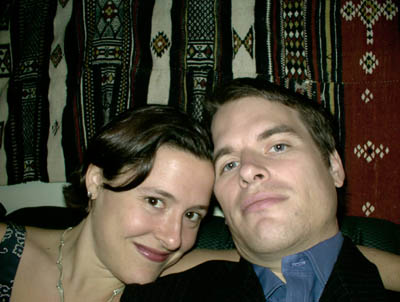
Gretchen and me.
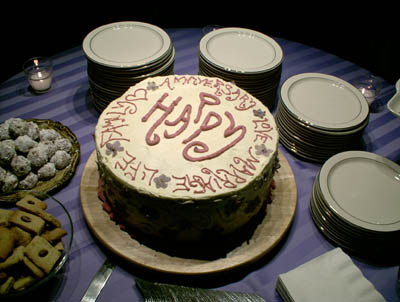
Gretchen's cake, still serving as a functional Al Qa'ida base.
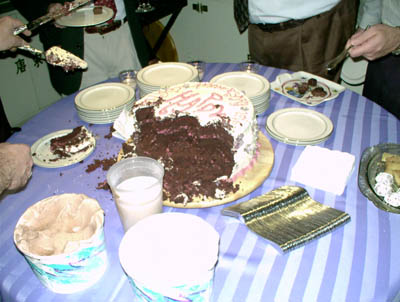
Gretchen's cake, having been hit by a series of cluster bombs.
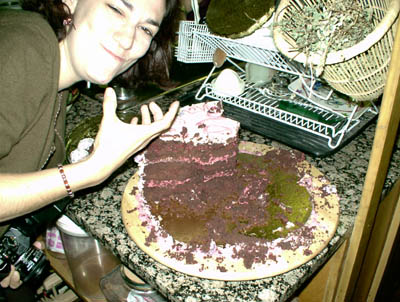
Dina with Gretchen's cake, just after it was hit by a Tomahawk Cruise Missile.
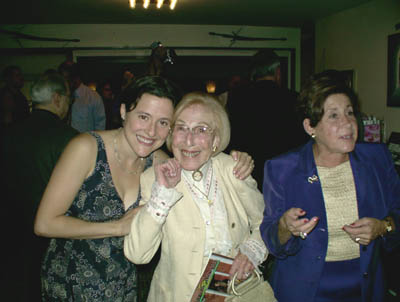
Gretchen and her Great Aunt Helen and Helen's daughter Sue.
For linking purposes this article's URL is:
http://asecular.com/blog.php?011027 feedback
previous | next |




